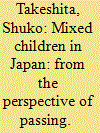| Srl | Item |
| 1 |
ID:
174810


|
|
|
|
|
| Summary/Abstract |
This study adopts Goffman’s concept of ‘passing’ to discuss the experiences of mixed children in Japan. Passing is ‘the management of undisclosed discrediting information about self’ and is a concept that has been evolved in the context of stigma. Since 1999, The author has conducted interviews with 139 mixed families of diverse nationalities and religions residing in Japanese urban areas. The aim of this research is to unravel two issues: First, do mixed children perceive their mixed background as a stigma? And second, do passing mixed children feel insecure or guilty about the fact that they are passing? This article concludes that whether or not the child is ‘visibly’ different from other children in Japanese society, and how their parents and teachers perceive their situations are major factors shaping the children’s experiences.
|
|
|
|
|
|
|
|
|
|
|
|
|
|
|
|
| 2 |
ID:
144694


|
|
|
|
|
| Summary/Abstract |
The purpose of this study is to examine the relationship between social and human capital regarding religious and language education among Japanese-Turkish families in Japan. The parents consider that it is their duty to pass on Islam to their children. Since Islamic education has a large influence on the children’s identity formation, parents give it a high priority. Concerning language, there is a tendency for the children to acquire Japanese as a primary language and English as a secondary language, despite the fathers’ desire to pass on Turkish. Turkish communities in Aichi Prefecture are composed of complex elements including place of origin, social and economic status, and ideologies of religious leaders followed. Intermarried families covered in this research obtain different social capital from each community. Even in the families who do not have the advantage of human capital, religious and language education is maintained in the community, where human and social capital mutually complement one another.
|
|
|
|
|
|
|
|
|
|
|
|
|
|
|
|